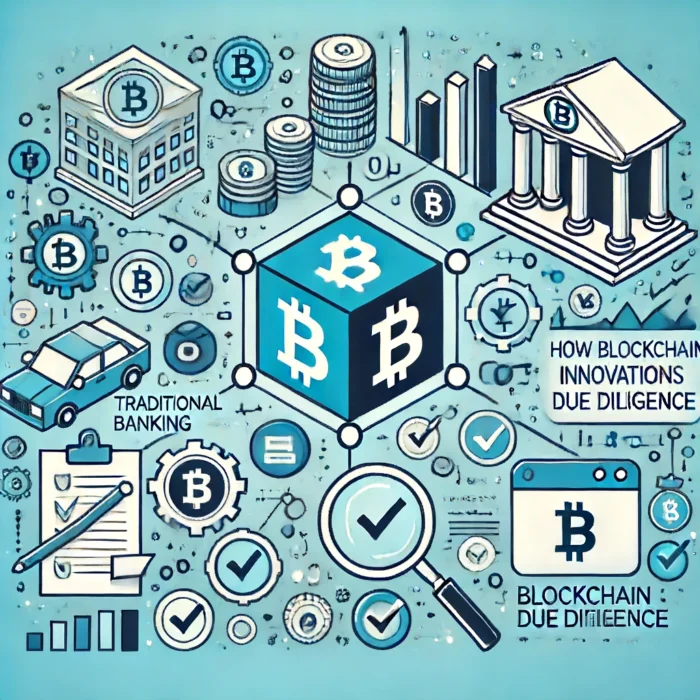Get Scam Alerts & The Latest Crypto News:
Picture the classic heist movie scene: a dapper gentleman smoothly walks into an opulent bank, a vault crammed with gold and money in the backdrop, the manager meticulously vetting him through various time-honored due diligence processes. Now, reimagine this scene, but this time, replace that vault with an intangible, encrypted digital ledger – the world of Blockchain. This is no longer a script from a Hollywood movie, but instead, the reality of today’s banking scene. Welcome to a brave new world where Blockchain innovations are dramatically redefining the meaning of traditional banking due diligence. Amidst the skepticism and intrigue that surrounds blockchain technology, this article unravels how it is poised to not only disrupt but potentially upgrade the painstakingly manual process of due diligence in banking. Prepare to delve into a narrative that interlaces finance, technology, and trust, in the most unconventional way.
Understanding the Basics of Blockchain Technology and Traditional Banking Due Diligence
With blockchain technology’s rise, traditional banking’s due diligence process is poised for significant alterations. Traditionally, due diligence in banking involves a comprehensive appraisal of a prospective or current customer to ascertain their credibility. This process typically includes an examination of financial records, assessment of material assets, and verification of personal information. However, blockchain technology is challenging this status quo.
Blockchain technology is essentially a decentralized system wherein transactions are recorded across numerous computers. This system ensures data integrity as once an entry is made, it cannot be altered retrospectively. This immutable nature of blockchain provides a greater level of transparency and security, elements that are crucial in due diligence.
Impacts of Blockchain Technology on Traditional Due Diligence:
- Enhanced Transparency: As blockchain ledger entries are transparent across the network, verifying the accuracy of transactions becomes easier, consequently improving the effectiveness of due diligence.
- Speedier Process: With blockchain, the verification of customer details can be expedited, thereby reducing the time taken for due diligence.
- Improved Security: The risk of fraud is significantly minimized as information on blockchain cannot be altered or tampered with.
Even though blockchain technology offers numerous benefits, it is imperative for banks to effectively integrate it into their existing systems. This might require an overhaul of their traditional methods, necessitating substantial time and resources. Moreover, the use of blockchain could potentially make the due diligence process more complex, particularly due to the anonymity often associated with blockchain transactions.
| Traditional Due Diligence | Blockchain-Enhanced Due Diligence |
|---|---|
| Time-consuming | Faster process |
| Dependent on manual checks | Automated verification |
| Prone to human error | Reduced scope for errors |
Ultimately, the incorporation of blockchain into banking due diligence processes could lead to more robust and efficient systems. However, its implementation must be thoughtfully planned to overcome potential challenges and ensure seamless integration with existing banking systems.
Exploring the Revolutionary Impact of Blockchain Innovations on Traditional Banking Practices
Blockchain innovations are rapidly changing traditional banking practices, offering revolutionary solutions for enhancing due diligence processes. Traditionally, these processes are time-consuming, lengthy, and prone to errors, but with the integration of blockchain technologies, these challenges are mitigated.
Blockchain offers a level of transparency that is unmatched by any other technology. This transparency is ensured by the decentralization aspect of blockchain where all transactions and information are stored across multiple nodes, making data manipulation almost impossible. This level of transparency is ideal for due diligence processes in traditional banking practices, where transparency and accuracy are of paramount importance.
Key Impacts of Blockchain Innovations on Banking Due Diligence processes include:
- Enhanced Security: Blockchain offers highly secure encryption, reducing the risk of fraud.
- Increased Transparency: The decentralized nature of blockchain increases transparency making financial auditing easier.
- Reduced Costs: By automating manual processes, blockchain can significantly reduce operational costs.
- Faster Transactions: Blockchain allows instant, peer-to-peer transactions, reducing the time taken for transfers.
In addition, blockchain’s smart contracts can automatically execute and enforce agreements, reducing the need for intermediaries and further increasing efficiency in due diligence processes.
| Traditional Banking Practices | Blockchain Impact |
|---|---|
| Manual due diligence process | Automated and efficient due diligence process using smart contracts |
| Potentially fraudulent transactions | Highly secure, almost zero-fraud transactions |
| Extended time for transfer processes | Instant, peer-to-peer transactions |
| High operational costs | Significantly reduced costs due to automation |
| Lack of transparency in transactions | Unmatched transparency due to decentralization |
The blockchain revolution is undeniably transforming traditional banking practices, making them more transparent, secure and efficient. As the technology continues to evolve, it’s exciting to imagine the potential for even greater strides in the advancement of banking due diligence processes.
Blockchain Technology: A New Approach to Enhancing Due Diligence in Traditional Banking
With the advent of blockchain, the traditional banks are finding novel ways to improve their due diligence processes. Blockchain technology is transforming the conventional banking landscape by offering a secure, transparent, and efficient platform for transactions. This has a profound impact on how banks carry out due diligence, thus enhancing the overall efficiency and integrity of the financial system.
Blockchain technology offers several key benefits for due diligence in banking. Firstly, it provides a decentralized ledger that is immutable and transparent. This ensures that all transaction records are secure and cannot be altered, thus minimizing the risk of fraud. Secondly, blockchain technology facilitates real-time verification of transactions. This accelerates the due diligence process and helps banks identify potential risks more swiftly. Lastly, blockchain can streamline information sharing between different banks and entities, making due diligence more effective and comprehensive.
- Decentralized Ledger: The use of a decentralized ledger ensures transparency and security, thereby reducing the risk of fraudulent activities.
- Real-Time Verification: Blockchain facilitates instant verification of transactions, enabling quicker identification of potential risks.
- Information Sharing: Blockchain technology simplifies the sharing of information between banks and various entities, enhancing the effectiveness of due diligence mechanisms.
Thus, the integration of blockchain technology into the banking sector can significantly enhance due diligence mechanisms. It offers a unique set of advantages which traditional banking systems cannot provide. However, for the full potential of blockchain to be realized in this field, regulatory frameworks need to be put in place to govern its use and protect consumers.
| Feature | Benefit |
|---|---|
| Decentralized Ledger | Enhanced Security & Transparency |
| Real-Time Verification | Swift Identification of Risks |
| Information Sharing | Improved Due Diligence Mechanisms |
While blockchain technology is still in its early stages of adoption in the banking industry, its potential to revolutionize due diligence processes is undeniable. With further research and development, blockchain could indeed be the game-changer in the financial sector, offering unprecedented levels of transparency, security, and efficiency.
Evaluating the Potential Challenges of Incorporating Blockchain in Traditional Banking Due Diligence
Over the last decade, the finance world has been significantly disrupted by blockchain technology. The benefits it brings, such as improved security, transparency, and efficiency, are undeniable. However, incorporating blockchain in traditional banking due diligence processes is not without challenges. Understanding these potential hurdles is key to implementing this technology in a seamless, effective manner.
Regulatory Environment: Financial institutions operate in a highly regulated environment, and compliance with these standards is non-negotiable. Banks need to ensure that their use of blockchain complies with existing regulations, including the Bank Secrecy Act (BSA) and the Anti-Money Laundering (AML) rules. However, blockchain’s decentralized nature can pose a difficulty as the responsibility for compliance is spread across multiple parties. Furthermore, regulations are not yet fully formed around blockchain technology, creating an uncertain environment for banks.
| Challenge | Explanation |
|---|---|
| Regulatory Environment | Unclear regulations and compliance issues |
| Technological Integration | Integrating with existing systems can be complicated |
| Security Risks | Blockchain might be exploited by malintent |
Technological Integration: Blockchain’s decentralized nature means its integration with existing centralized systems can pose significant technological challenges. Banks need to develop or acquire the appropriate technology to integrate blockchain with their existing systems. This can lead to high initial costs, and the need for new skill sets and knowledge.
Security Risks: Despite its enhanced security features, blockchain technology is not immune to security risks. Banks need to consider potential risks such as the immutability of records, where erroneous or fraudulent transactions cannot be reversed, and the risk of private keys being stolen, which would allow unauthorized access to the blockchain.
Despite these challenges, it is clear that blockchain technology has the potential to revolutionize the banking industry. The key is to understand and mitigate these potential issues through careful planning, effective risk management, and ongoing monitoring and testing.
Recommendations for Leveraging Blockchain Innovations for Enhanced Due Diligence in Traditional Banking
Blockchain is redefining the financial landscape with its decentralized and transparent characteristics. Traditional banks are no exception to this transformation. In fact, by leveraging blockchain innovations, banks can significantly enhance their due diligence process, resulting in improved risk assessment, customer verification, and compliance management.
Blockchain and Customer Verification: The traditional banking system has always faced challenges in customer verification and identification due to its centralized nature. Blockchain technology, with its decentralized nature, offers a more efficient and secure way of verifying customer identities. The use of cryptographic algorithms and digital signatures in blockchain ensures that the customer data is secure and tamper-proof. Furthermore, the transparent nature of blockchain maintains a comprehensive record of all customer transactions, thereby simplifying the due diligence process.
Blockchain and Risk Assessment: Risk assessment is another area where blockchain can bring significant improvements. By maintaining a transparent and immutable record of all transactions, blockchain allows banks to accurately assess the creditworthiness of their customers. This reduces the risk of fraudulent activities and enhances the credibility of the banking system.
| Blockchain Aspects | Banking Improvements |
|---|---|
| Decentralization | Efficient and secure customer verification |
| Cryptographic Security | Enhanced data security |
| Transparency | Accurate risk assessment |
Blockchain and Compliance Management: Compliance management is a crucial part of any banking system. However, it often involves cumbersome paperwork and inefficient processes. Blockchain, with its smart contracts, can automate these processes, making compliance management more efficient and less prone to errors. A smart contract is a self-executing contract with the terms of the agreement directly written into code.
Blockchain innovations offer immense potential for enhancing the due diligence process in traditional banking. By leveraging these innovations, banks can improve their customer verification, risk assessment, and compliance management, ultimately leading to a more secure, transparent, and efficient banking system.
In Summary
In the cathedral of traditional banking, a new melody is starting to echo, redefining the reverberations of diligence and proficiency. The blockchain, cloaked in its profound layers of technology, is steadily altering the cadence of due diligence, infusing it with an incorruptible rhythm of transparency, security, and efficiency. As we continue to dance to this emerging rhythm, the steps may initially seem challenging, even awkward. But with continuous learning, adaptation, and orchestration, traditional banking can transform this dance into a harmonious symphony of innovation, trust, and growth. And while the final composition is yet to be heard, one thing is clear—blockchain is not just an innovation, it is the maestro of a new financial concert we are all learning to appreciate. The curtain is just beginning to rise on blockchain’s performance in the realm of banking due diligence. Stay tuned to hear the full symphony.

